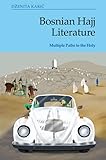Bosnian hajj literature : multiple paths to the holy / Dženita Karić.
Material type: TextPublisher: Edinburgh : Edinburgh University Press, [2023]Copyright date: ©2023Description: 1 online resource (xii, 243 pages ): illustrationsContent type:
TextPublisher: Edinburgh : Edinburgh University Press, [2023]Copyright date: ©2023Description: 1 online resource (xii, 243 pages ): illustrationsContent type: - 9781474494120
- 1474494129
- 9781474494137
- 1474494137
- Muslim pilgrims and pilgrimages -- Saudi Arabia -- Mecca
- Muslims -- Bosnia and Herzegovina -- History
- Muslims -- Bosnia and Herzegovina -- Biography
- Travel writers -- Bosnia and Herzegovina -- Biography
- Travel writing -- Bosnia and Herzegovina -- History
- Islam -- Bosnia and Herzegovina -- History -- Sources
- Islamic literature -- Bosnia and Herzegovina -- History and criticism
- Islamic stories -- History
- Islamic literature -- History and criticism
- Musulmans -- Bosnie-Herzégovine -- Histoire
- Musulmans -- Bosnie-Herzégovine -- Biographies
- Voyage -- Art d'écrire -- Bosnie-Herzégovine -- Histoire
- Islam -- Bosnie-Herzégovine -- Histoire -- Sources
- Littérature islamique -- Histoire et critique
- Récits islamiques -- Histoire
- HISTORY / Europe / Eastern
- Travel writing
- Travel writers
- Islamic stories
- Islamic literature
- Islam
- Muslim pilgrims and pilgrimages
- Muslims
- Bosnia and Herzegovina
- Saudi Arabia -- Mecca
- 297.3524 23
- BP187.3 .K279 2023
- online - EBSCO
| Item type | Current library | Call number | URL | Status | Notes | Barcode | |
|---|---|---|---|---|---|---|---|
 eBook
eBook
|
Biblioteca "Angelicum" Pont. Univ. S.Tommaso d'Aquino Nuvola online | online - EBSCO (Browse shelf(Opens below)) | Online access | Not for loan (Accesso limitato) | Accesso per gli utenti autorizzati / Access for authorized users | (ebsco)3464739 |
Includes bibliographical references (pages 216-232) and index.
Description based on print version record.
Frontmatter -- Contents -- Figures -- Acknowledgements -- Note on Transliteration -- Timeline -- Introduction Writing about the Hajj through the Centuries -- 1 The Meanings of the Sacred -- 2 The Roads to Mecca -- 3 Change -- 4 Dis/Connections -- 5 Bosniaks between Homeland and Holy Land -- Conclusion: The Persistence of Devotion -- Bibliography -- Index
Explores changing attitudes to the holy through a study of five centuries of Bosnian Hajj literatureDiscusses Hajj literature from Bosnia written between the 16th and 21st centuries in Arabic, Ottoman Turkish and BosnianEngages with a variety of classical and modern genres including narrative accounts, travelogues, journalistic reportages, diaries, letters and postcards, religious treatises, essays, poems and playsStands at the intersection of Islamic studies, religious studies and broader area studiesRecentres the study of Islam on practices and writings, and on the Balkan experiences, which are often seen as 'peripheral' within the Muslim worldThis is the first critical and theoretically grounded book-length study of Hajj literature (written texts about the experience of the Hajj) and Hajj practices of Bosnian Muslims. It redefines the ways pilgrimage can be understood and offers new methods for investigating the meaning and importance of Hajj for generations of premodern and modern believers. It also throws light on Balkan communities previously ignored by modern scholarship in Islamic, religious, and area studies. Breaking with the predominant academic trends of focusing on nationalism and ethnic conflict in the region, it instead puts the spotlight on the richness of texts, and visual and archival material, and focuses on genres that challenge the established literary canons.
In English.


